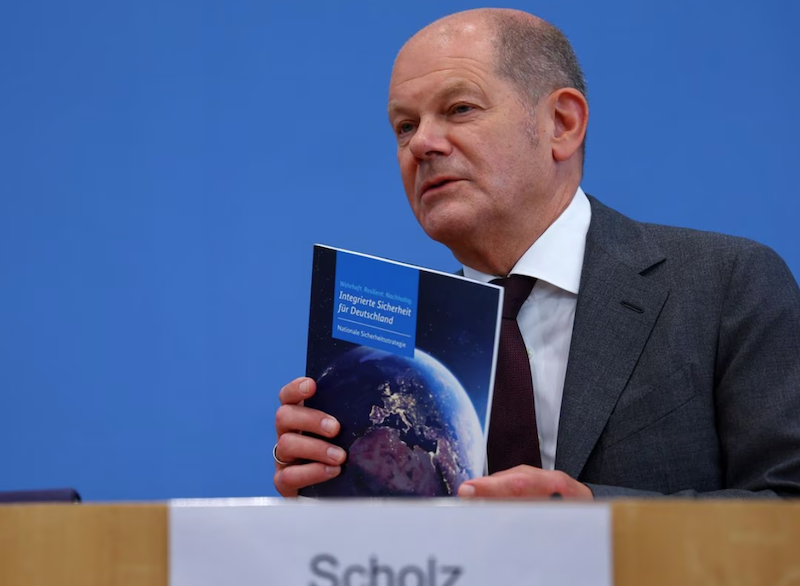Germany has dubbed China a growing threat to global security and slammed its economic aggression to achieve political goals.
Unveiling its first national security strategy on Wednesday, Berlin confirmed a shift in emphasis from economic interests to geopolitics following Russia’s invasion of Ukraine.
Using blunt language about its top trading partner, the strategy document describes Beijing as aggressively looking to claim supremacy in Asia.
The document highlights the main threats Germany perceives it faces, from climate change to supply chain disruptions, and includes a few policy specifics, such as a commitment to raising defence spending and creating an agency to fight cyberattacks.
Also on AF: EV Boom Amps Up Costs, Environment Risk in China’s Lithium Hub
Analysts noted it does not prioritise which threats to fight or contain any major surprises. It also omits some major issues, such as Taiwan.
“This is a major change being carried out by us in Germany in how we deal with security policy,” moving from a military strategy towards an integrated security concept, Chancellor Olaf Scholz said at the presentation of the document, while adding a more detailed China strategy should be ready soon.
“In future, we will focus more on security when it comes to decisions on economic policy,” Foreign Minister Annalena Baerbock said. “We paid for every cubic metre of Russian gas twofold and threefold with our national security.”
Germany’s reliance on Russia for around half its gas imports prevented it from immediately being able to stop energy trade with Moscow after it invaded Ukraine in February 2022. Russia is the top threat to European peace “for now”, the National Security Strategy (NSS) said.
The document highlights the need for Germany to reduce all dependencies on other countries for commodities and incentivise companies to hold strategic reserves.
“China is deliberately exerting its economic power to reach political goals,” reads the NSS, which comes just a week before German-China government consultations are due in Berlin.
German Bosses Say Decoupling ‘Unthinkable’
However, China remains a partner the world needs to resolve global challenges and crises, it added.
At nearly 300 billion euros ($325 billion) in imports and exports, China is Germany’s most important trading partner and a core market for top German companies including Volkswagen, BASF and BMW.
Many German CEOs have warned of the risks of cutting or reducing links with the world’s second-biggest economy.
Mercedes-Benz CEO Ola Kaellenius said in April decoupling from China was “unthinkable for almost all of German industry”.
However, many German businesses accept that dependency on China for critical raw materials needs to be addressed.
Baerbock said government officials had held “intensive talks” with companies active in China.
“The good thing is that German companies are drawing similar conclusions to the German federal government,” she said.
Still, Noah Barkin, an analyst with Rhodium Group, said the strategy may be most interesting for what it does not contain.
“There is no mention of Taiwan – probably the biggest security challenge of the coming years,” he said.
China claims democratically governed Taiwan as its own territory and has never renounced the use of force to bring the island under its control.
- Reuters with additional editing by Sean O’Meara
Read more:
China Becoming More Rival Than Partner: Germany’s Baerbock
Taiwan Ramps up Drone Development to Guard From China Threat
China Decoupling Will Cost Jobs: Germany Finance Minister
Taiwan Issues War Survival Handbook Amid China Threat
China Decoupling Unfeasible, Would Carry Huge Costs: Merck CEO
























